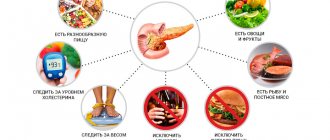04/29/2019 Olga Migunova 0 comments
In a normal healthy state, the internal environment of our gastrointestinal tract is capable of breaking down almost all edible products that enter it into their components. Well, what foods are poorly digested?
We're talking about food, right? And not about the desire to digest iron nails and tree bark? So, if the gastrointestinal tract is healthy, it will digest any food, with the exception of particles that accidentally enter the stomach, for example, hard fruit seeds.
Why is it that in some cases the digestion process is disrupted and the body reacts to certain foods with indigestion and dyspepsia? Let's figure it out.
Provoking factors
Photo: https://pixabay.com/photos/abdominal-pain-pain-appendicitis-2821941/
Food will be poorly digested if there are certain provoking factors:
- metabolic disease;
- insufficient production of enzymes that promote digestion;
- insufficient acidity of gastric juice;
- diseases of the gastrointestinal tract, for example, the presence of stomach or duodenal ulcers, inflammation of the pancreas;
- insufficient muscle tone, when food does not move well through the gastrointestinal tract and gets stuck in the stomach for a long time in the form of a coma. Over time, the lump becomes even denser, and it is even more difficult for it to move forward.
Healthy stomach and food digestion
So, if a person has a healthy stomach, he will not face problems with digesting food?
The main thing is that food products are of good quality? Not certainly in that way. The amount of food is also important. You can overload your stomach with the highest quality food, for example, by eating vodka with a snack, eating a bowl of fatty pork dumplings with sour cream and mayonnaise, and then drinking sweet tea with a few pieces of cream cake.
Any stomach will not have enough enzymes to digest all this, despite the fact that all the dishes were benign and fresh. The stomach will react to overload with vomiting, bloating and all signs of poisoning.
When I eat I am deaf and dumb
This saying is true in all cases. When a person eats, he should not do anything else. Nutrition is the most important process of maintaining life. Food is the “fuel” on which each of us lives. Anything that interferes with digestion should be put aside:
- reading while eating;
- watching TV shows or news on a computer monitor;
- communication by phone;
- clarifying relationships and speaking in a raised voice.
Food swallowed “under stress” cannot bring any benefit. When a person is involved in emotions - no matter whether they are positive or negative - the whole body reacts to this. The heart speeds up, the lungs breathe faster, and the stomach and intestines contract. Normal digestion against the background of a scandal is completely impossible. The food “stays too long” and rotting begins with all the ensuing consequences.
Read more: How to eat to make your stomach easy?
The faster food is digested, the healthier it is?
By the way, if we are talking about digestion, then the main processes occur not in the stomach, but in the small intestine. In the stomach, food is just beginning to be digested, interacting with gastric juice.
The digestive tract takes a different amount of time to digest each product, but the conclusion that the faster the digestion process occurs, the more beneficial the food product is for the body, will again be incorrect.
Our body is adapted to digest different foods: proteins, fats, carbohydrates. Many of them are digested only in heat-treated form, others are digested raw and fresh.
The lists of “indigestible” foods floating around the Internet are nothing more than myths. Don't believe me? Then think about the therapeutic diets that doctors prescribe for patients with various diseases of the stomach, intestines, and other internal organs. They are different, they include different groups of products depending on the disease. To each his own.
A doctor must prescribe a therapeutic diet.
A healthy diet is a varied diet that contains all groups of nutrients.
The most difficult food to digest has been identified
Nutritionists talked about which foods are the most difficult to digest. Each of us, at least once in our lives, having eaten something wrong, experienced the feeling that he had swallowed a whole bag of small stones, without chewing.
Not entirely pleasant sensations that can be avoided by following a few simple rules of proper nutrition and maintaining balance when choosing your next lunch or dinner. Gas, bloating, heartburn, heaviness in the stomach - all this is caused by poor nutrition. And it’s enough just to know which products should be consumed, and which ones to expect a catch.
One of the enemies of a healthy stomach is fried food. Nutritionists often insist that fried foods are extremely harmful to the body. Indeed, consuming oil and fats that have been cooked in a frying pan is very harmful to the pancreas. The body spends more energy and microelements on digesting fatty foods than it receives in return. Even the much-loved kebab is a difficult-to-digest product for the stomach.
Nutritionists also loudly and unanimously signal the dangers of spicy food. Substances that add spiciness to dishes are irritants to the walls of the stomach. As a result of their consumption, heartburn may occur. Therefore, before going to a Mexican restaurant, you should think about the consequences of ordering hot jalapeno peppers or hot wings.
It is a well-known fact that legumes provoke excessive gas formation. Indeed, beans contain a special carbohydrate that causes bloating. To reduce the risk of bloating, you can soak the beans in water before cooking.
Onions are also an irritant to the walls of the stomach: both onions and green ones. Of course, no one denies the beneficial properties of this vegetable, which affect the strengthening of the immune system, but if a person has problems with the digestive system, one should be more careful with eating onions.
As dieters know, broccoli and cauliflower are so-called negative calorie vegetables. Indeed, the body spends more calories digesting these vegetables than it receives. But in addition to this important property for people losing weight, these inflorescences contain a special carbohydrate that causes flatulence and bloating, so you need to be careful with the amount of these vegetables.
In any case, when consuming the products described above, you need to know a sense of proportion or even refuse to use them.
There are different types of fiber
Photo: https://pixabay.com/photos/salad-fruits-berries-healthy-2756467/
The most difficult foods to digest are those that contain a lot of fiber. What is fiber? Dietary fiber found in plants. However, not everything is simple here either. Fiber can be soluble or insoluble in water. So, soluble fiber is digested by microorganisms that inhabit the intestines, which often results in excessive gas formation and bloating.
Soluble fiber is found in large quantities in oatmeal, citrus fruits, and legumes. They are very useful, but you should not abuse them or consume them in large quantities.
Insoluble fiber is found in cabbage, carrots, beets, and whole grain bread. It does not interact with intestinal microorganisms, but simply passes through the gastrointestinal tract practically unchanged.
One can say about it that it is not digestible. But its quantity in these products is small enough to cause any negative effects.
Let's talk better about the speed of digestion of foods. It is important in order to create the most comfortable diet.
Easy and difficult to digest foods
According to the time of assimilation, all products can be distributed as follows.
| Category | Products | Digestion time, hour |
| Easy to digest | Fruit and vegetable juices, vegetable broth | 15 – 20 minutes |
| Juicy raw fruits, eaten separately - watermelon, melon, cucumber, tomato, orange, grapes | from 30 to 60 minutes | |
| stone fruits – cherry, apricot, peach | up to 50 minutes | |
| raw vegetable salads without dressing | 40 minutes | |
| boiled vegetables - zucchini, squash, cauliflower | 30 – 40 minutes | |
| fatty fish, salted, boiled or baked - herring, salmon, trout | from 45 to 60 minutes | |
| lean fish – boiled and baked | up to 40 minutes | |
| eggs | 50 minutes | |
| root vegetables - beets, carrots, turnips | 50 minutes | |
| poultry meat without skin – turkey, chicken | up to 1 hour | |
| Moderately digestible | avocado | up to 2 hours |
| boiled whole grains – rice, buckwheat, millet, corn, pearl barley, oatmeal | up to 90 minutes | |
| legumes – peas, beans, chickpeas, lentils | up to 90 minutes | |
| sunflower seeds, sesame, soy | up to 2 hours | |
| meat broth, cocoa | up to 2 hours | |
| dairy products - milk, low-fat cottage cheese and cheese | up to 2 hours | |
| nuts – peanuts, cashews, walnuts | up to 3 hours | |
| raw vegetable salad with butter | from 1.5 hours | |
| rye bread and potatoes, ham | 3 hours | |
| Hard to digest | hard fatty cheeses | 4 hours or more |
| fatty and fibrous meats - horse meat, beef, lamb, pork | 5 or more hours | |
| fried meat and mushrooms | from 4 hours | |
| Indigestible | vegetable fiber, fruit skin, hard cartilage |
Read on the topic: How to behave correctly after a hearty lunch: good and bad habits
Food groups by digestion speed
Based on the speed of digestion, all food products are divided into four groups.
First group
The first group is food that is digested in 45 minutes or faster. This includes almost all fruits, with the exception of avocados and bananas, many carbohydrate foods, juices, some vegetables, and low-fat dairy products.
Second group
The second is foods with an average digestion speed (1.5 - 2 hours). These are light protein products, herbs, vegetables, dried fruits, and dairy products of soft consistency.
Third group
The third group is products that take a long time to digest (2.5 – 3.5 hours). This group includes products with a high fat content, cottage cheese and hard cheeses, meat, fish, and poultry. The speed of digestion and assimilation of such products depends on the volume of food eaten and the method of preparation.
Fourth group
The fourth group includes foods that are not digestible by some people. They are not harmful or unnecessary to the human body. Often, on the contrary, they contain important biologically active compounds, but not everyone can digest them without problems.
So, many people cannot digest mushrooms; many people have indigestion caused by nuts and seeds. For others, digestion of certain meats or raw legumes causes problems. There are groups of people who do not digest milk.
Digestion time for different foods
Of course, the most easily digestible drinks will be drinks.
So, water, if you drink it on an empty stomach, will immediately “follow” into the intestines, and the stomach will need up to 30 minutes for juices . The same amount of time is needed to digest the broth.
It will take about half an hour for fresh fruits and vegetables. But dried fruits will “stay” in the stomach for at least 2 hours.
Cereals and legumes can be digested in 1.5-2.5 hours. A similar time is allocated to the gastrointestinal tract for seeds and nuts if they are not thermally processed.
As for dairy products, if they are low-fat, they will stay in the stomach for up to 1.5 hours. The higher the percentage of fat content, the more time it takes to assimilate.
Meat, depending on the type, is digested from one to five hours. Unlike fish, which the body will spend no more than an hour on.
Important Takeaways
What conclusions can be drawn and what can be advised to people who have problems with the gastrointestinal tract: constipation, bloating, heartburn and other disorders?
- Deal with individual intolerance, if any, and do not eat foods to which the body does not react well.
- Carefully study which foods are difficult to digest. Give preference to products from the first and second groups.
- Try not to eat foods that take a long time to digest at night. Food must be digested before a person gets ready to go to bed.
- Consume foods when heated. Despite the fact that cold food is usually digested faster, fewer nutrients are absorbed from it.
If problems with digestion worsen, it is advisable to consult a doctor, he will prescribe an examination and select treatment.
Nutritional and Digestive Health
Our stomach is the main indicator of our health. Gut flora is responsible for the absorption of our food into our bodies, but it also decides the levels of inflammation and immunity we will have. How much you weigh, the presence of acid reflux and digestive problems are solved by bacteria in the gut. And what we eat has more consequences than we can imagine. Poor diet can lead to many problems such as irritable bowel syndrome, gastroesophageal reflux (GERD), constipation or diarrhea.
And this “poor eating” phenomenon gets worse during the holiday season! As the New Year approaches, all healthy diets will be forgotten like party plans! That said, let's take a look at:









